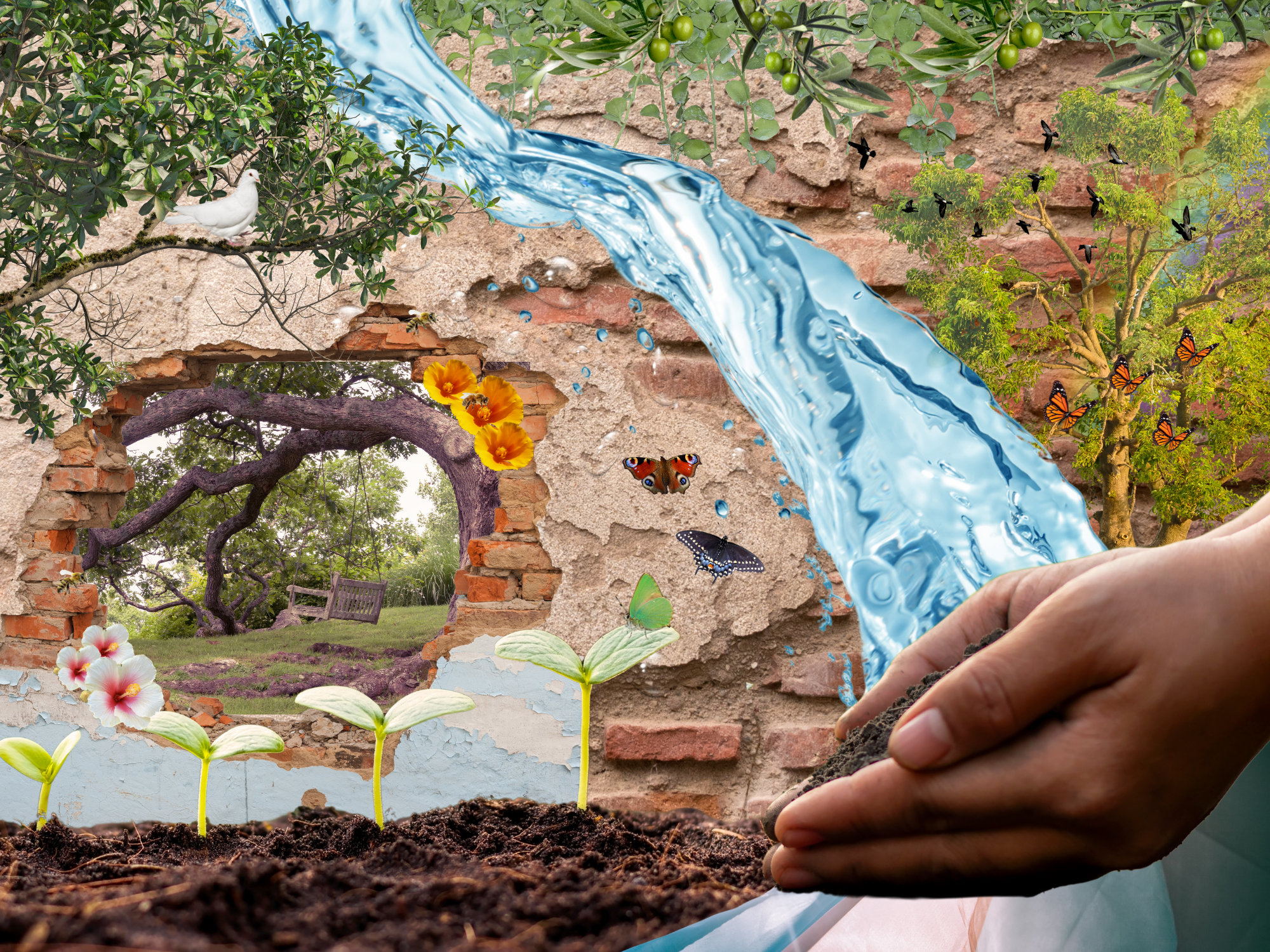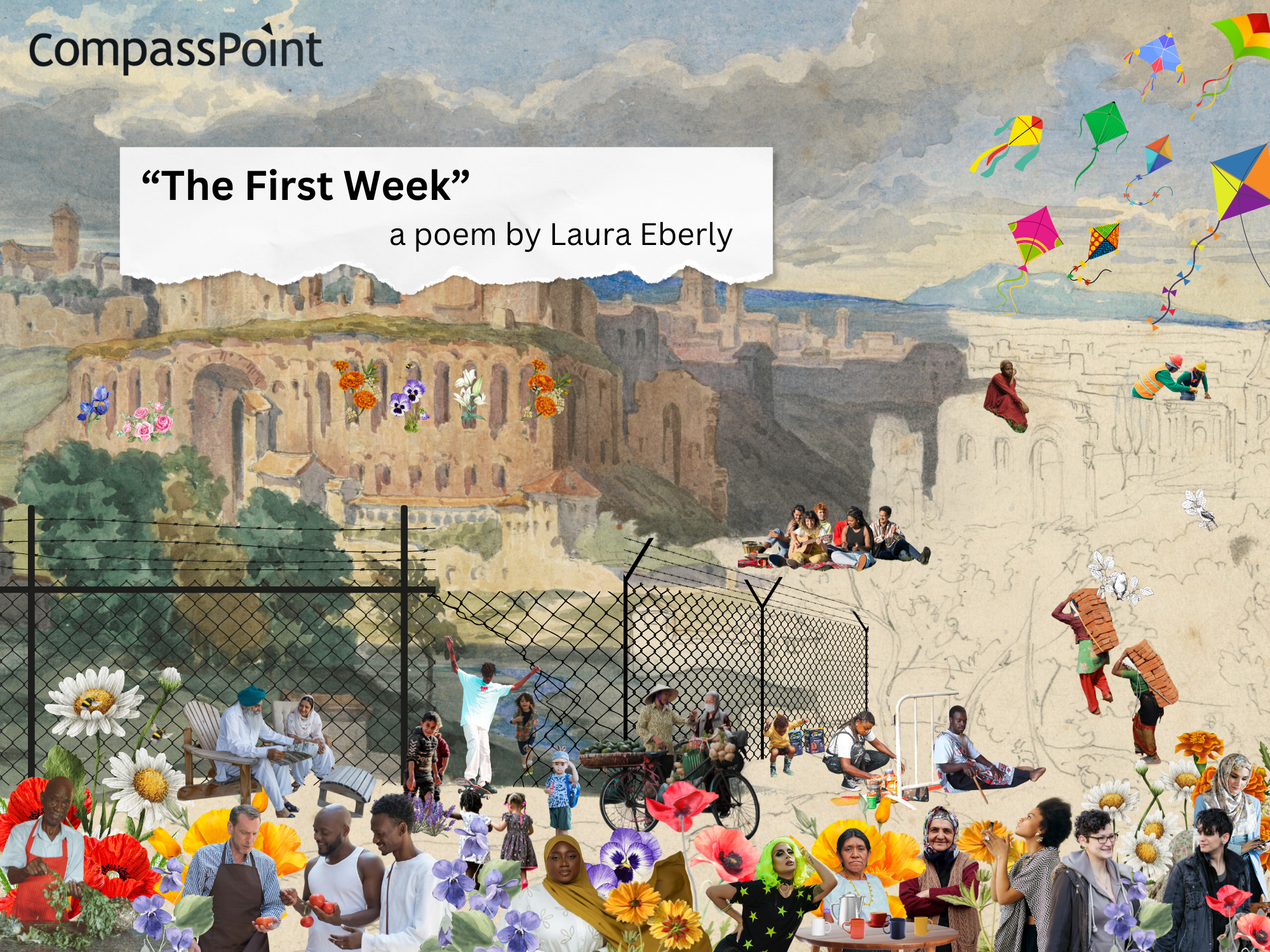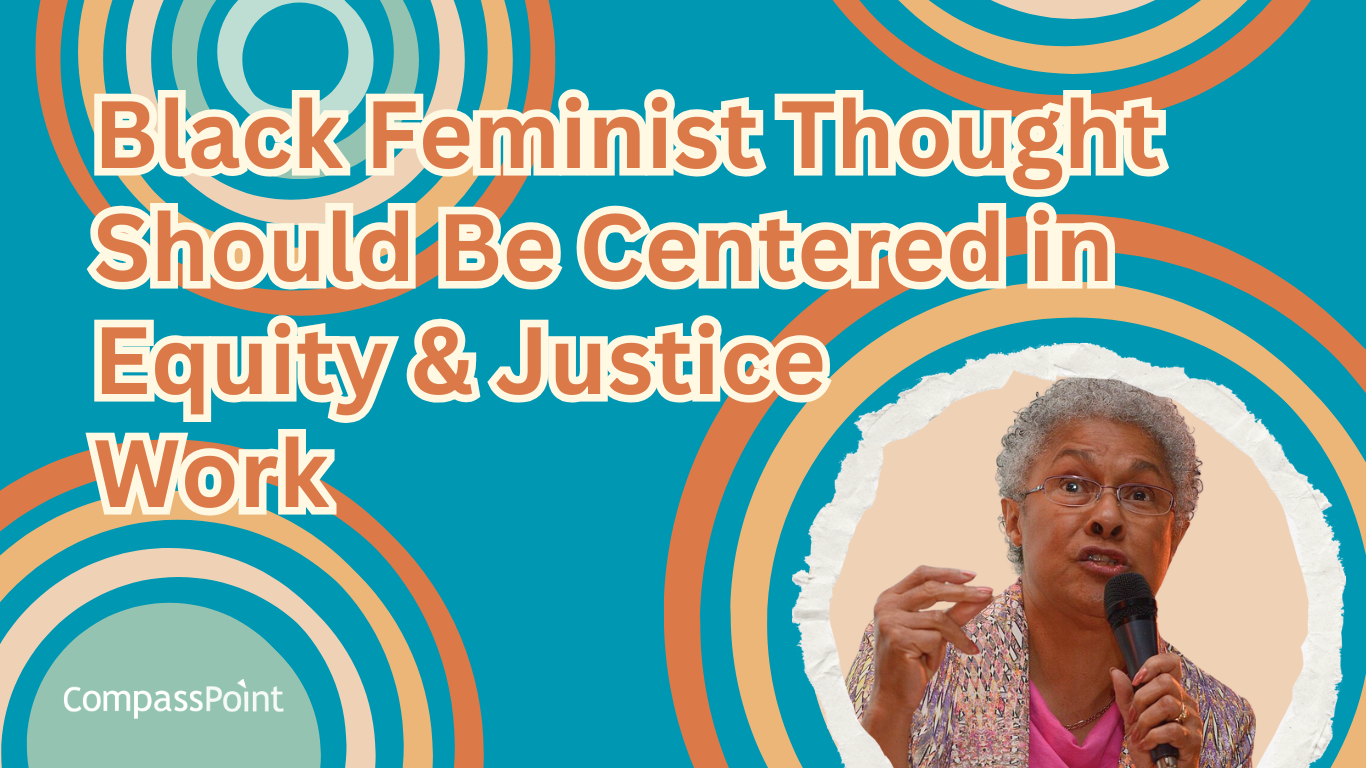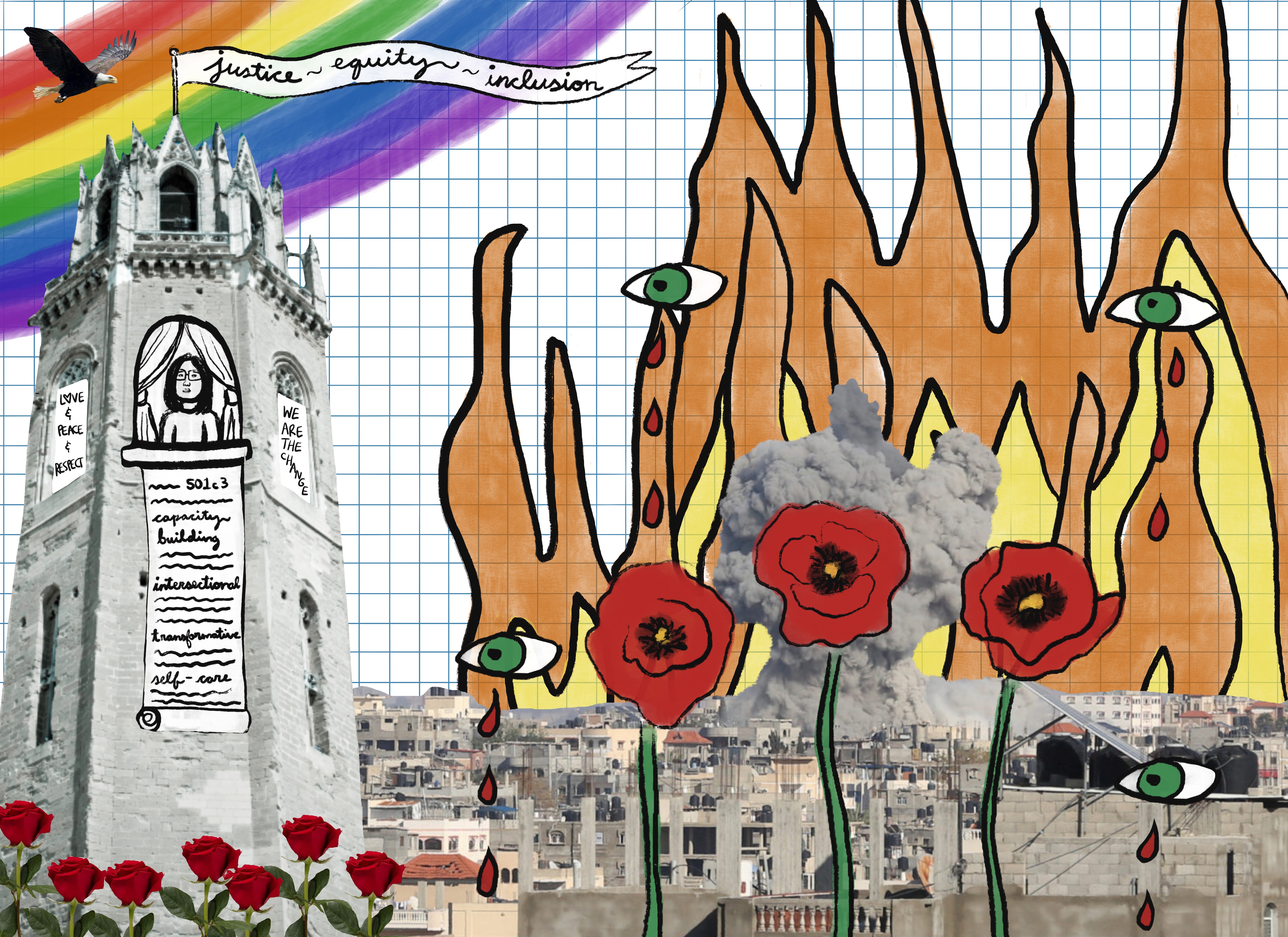[Image description: A collage art piece featuring a crumbling brick wall with nature creeping in all around. A stream of water flows into the foreground where two cupped hands add soil to budding plants. Butterflies and birds flutter and lurk throughout.] Collage art by Learkana Chong
CompassPoint Executive Director Shannon Ellis reflects on the overlapping crises of this political moment and invites everyone in progressive organizations and the social change sector to consider how we can tap into the creative side of our power.
These first two months since the shift of presidential power have been mind-numbing and heart-wrenching. Even if we expected it would be like this—we read Project 2025, heard what was “promised” on the campaign trail, sensed and analyzed the coming shifts in power and structures—it doesn’t make it any easier to experience the vitriol, the erasure, and the violence that has been and will be done by federal authority being wielded in this way, and the national narrative being shaped to support it.
There are, and will be, real and significant losses to lives, livelihoods, community institutions, and the land we live on and with. Community networks, relationships, research and data, artistic work, organizations—many that took decades to build— are already and will likely continue to be disappeared, displaced, and irrevocably and irreparably damaged. It is devastating to experience this; to see these early impacts on our families and communities. Many of us are grieving for what’s happening now, and what is to come.
In these early days, bewildered by the unrelenting onslaught of executive orders, judicial actions, and information that changes minute by minute, many of us are also in the confusion and despair of being caught in an ocean wave—regardless of whether we saw it coming or not, are good swimmers or not, right now we are captured by the utter chaos of a crashing wave. It’s a terrifying experience, to be thrashed around unable to grasp a breath, seeing glimpses of light through the surface but not being able to reach it. Our instinct is to fight, to flail, to grasp for life. Maybe needing to, for the moment, yield to the forces that have gripped us, grasped us. Until we surrender a bit and let it spit us out. Then, breathe. And as soon as we see a slate of clear water, move. The next wave will be coming, and we need to get to dry land.
Claiming not only our power to disrupt, but also to create
There’s no question—even before these election results were known—that we’re living in an era of significant systems churn and battles for power. At this time, the people who hold more structural authority have a clear and destructive agenda that they are prepared to execute in the most vicious of ways. Some of us may see this as a period of backlash to hard-fought gains, or of dying systems grasping for life, while new systems and relationships are not yet established enough to take root. Whatever story we’re using to anchor ourselves in this, there is no doubt that we’re living through a period of significant, disruptive, transformative change.
The contradiction is, we also know that transformative change is what is needed. Maybe not like this, or in this way, or with these losses, or most obviously toward these ends. But if transformation is what we’re truly about, what might we do to seed it in these times? What opportunities for liberation might take hold amid this level of collective confusion, despair, and uncertainty?
As we experience this period of reckless dismantling on the national stage, we must also remember that there are many, many, many of us who believe, who know, that doing the deeply challenging work of creating something new out of the conditions we’re in is the path forward. Our very survival depends on the fact that as humans, we are deeply connected with and accountable to each other. As a nation, we must address and correct the original sins and unreconciled contradictions of this country—founded with explicit values of freedom, equality, and democracy, while failing to address the fact that slavery, exploited labor, genocide, displacement, and land theft were as much part of our foundation as those professed values.
I am among those of us who journey toward this liberation: we are the seekers, the strivers, those who insist there is something beyond all this and will persist to find it, to create it, to build it together. Those of us on this path are committed, determined, and perseverant by nature; we are also soulful, wholehearted, and will rightfully, ragefully grieve and fight as we insist on loving and living toward a future with freedom and interdependence at its core.
What we may not yet fully grasp is that it is within our relationships and our determination—in the chaotic territory of navigating our rage and our grief, and also our love and our connection—that we may be able to activate the true and lasting source of our power. This power has a duality; it can manifest as disruption and defense, fueled by raw emotion and tactics, and it can also manifest as creation and possibility, fueled by radical imagination and hope. We can, and will, and must, access the power that comes from rage and grief. This is the power that erupted after the murder of George Floyd and again with the U.S.-backed genocide in Gaza. Activist power and public outrage can shift conditions at the surface, some of which we’re seeing the backlash to now with the rollback of “DEI” programs, detainment of activists and academics acting in solidarity with Palestine, and threats to university funding as a mechanism for dismantling the right to protest and free speech.
We will need to—not only for justice but also for our well-being and our connection with each other—continue to access this kind of power. This is part of the power of fighting what’s wrong. It’s important and necessary. But we also need to access the power of building something new. This kind of power, I believe, we have not yet been able to grasp and guide consistently, to move from cyclical gains and reliable backlash toward a sustained path that leads to our collective freedom.
It may be our very fear of power and our conditioned reaction to it that has kept us from fully wielding the full possibility of liberatory power—a more creative, inclusive, and life-giving form. We are so used to pushing hard against authority, and it has exhausted and depleted us. We’re deeply conditioned by our daily experiences—large and small—to conflate authority, influence, and power, and to see them most consistently used to control, to squash, to make small, to erase.
By design, the fighting-what’s-wrong type of power leaves us without the energy to express or truly experience the power of creation, to bring forth at scale what we’ve experienced in bits and pieces of human connection in our own small lives—of falling in love, of giving birth, of grieving a death, of building a community, a family; of art, of humor, of debate, of nature, and of losing ourselves in a creative collaboration. These acts of love, care, and creativity are, in fact, the building blocks of our future, of all human and planetary life past and future, and they are powerful—they shift things—even if they are devalued and ignored and tramped over in our current reality.
How will we (re)source this power during this time?
Working together to repair the damage of the past and present—and the damage yet to come—will itself begin to knit us into the formations that lay the foundation for the future. We have generations of ancestors before us who fought toward liberation in their times; our generation's particular battle is taking shape before us. And by “our generation,” I mean if you are living in these times, and in this place. All of us have a role to play in this shift—our children, our elders, folks newer to the social change sector or to movement work, and those who have experienced shifts and cycles before that we can draw lessons from.
One element that is unique to this time and place—relative to global, centuries-long struggles for freedom—is that many of us who strive toward liberation find ourselves working in nonprofits, or sometimes in philanthropy. This is a difference in this generation’s fight; the existence of so many nonprofit organizations and a vast, but disparate, workforce. More and more of us are becoming skilled at naming the deficiencies of these structures, but what of the possibilities? What might we activate within the workforce that is here, and the infrastructure that has been created over the last five decades, even (and especially) while it comes under explicit attack?
It’s looking likely that many nonprofit organizations will get smaller in the coming years, or will need to move into different shapes and forms. We will likely need to create new alliances, partnerships, ways of doing the work together. I don’t think we can predict exactly how this will unfold, and it will be painful. But also some of our potential for power may lie in the fact that while we are small, we are many.
Whatever we will face in these coming years, we’ll need to support each other and strategize together as we create an alternative future to the one looming over us. We cannot do this alone or in isolated silos. This will need to be multi-generational, multi-racial, cross-class, cross-organizational, cross-positional work. And it will be a fight. For many of us, it may feel like we’ve been fighting. And we’re exhausted, done. How can we possibly muster up the energy to keep going? But what if we don’t fight in this way anymore. Rather than drawing from that empty well, what might it look like to nourish each other, to fill our wells, to lean on each other and possibly take some of the biggest risks of our lives together? What if this is a different kind of fight—where we focus more of our collective energy on building what we’re fighting for than pushing back what we’re fighting against?
“You don’t choose the times you live in, but you do choose who you want to be and how you want to think." – Grace Lee Boggs
These may not be the times we would choose to live in. But here we are. And who we will choose to be in these times is within our power. Let’s claim that power, together.






Submit a comment